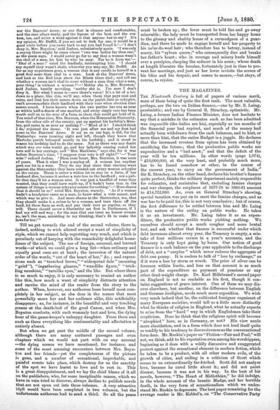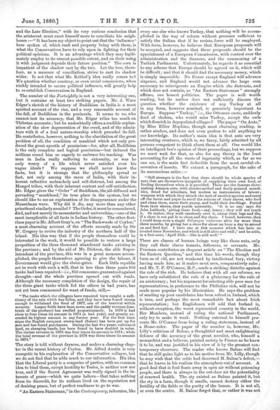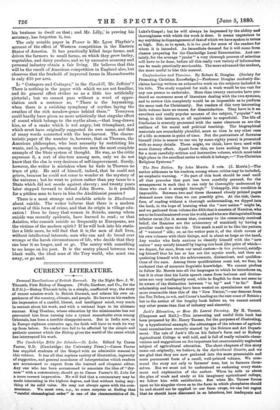THE MAGAZINES.
Tics .ZsTineteenth Century is full of papers of various merit, none of them being of quite the first rank. The most valuable, perhaps, are the two on Indian finance,—one by Mr. S. Laing, pessimistic; and one by General R. Strachey, optimistic. Mr. Laing, a former Indian Finance Minister, does not hesitate to say that a mistake in the estimates such as has been admitted was impossible (the italics are his), especially as ten months of the financial year had expired, and much of the money had actually been withdrawn from the cash balances, and to hint, or more than hint, that the entire Budget is a juggle. He declares that the increased revenue from opium has been obtained by sacrificing the future ; that the productive public works are unproductive and a "bad asset ;" and that the deficit of the year will be ten millions. In other words (page 1,074), " M0,000,000, at the very least, and probably much more, has to be found somehow or other, in the course of the current year, to carry on the government of India.'' Sir R. Strachey, on the other hand, declares his brother's finance quite perfect, thinks the military department mainly responsible for estimates, and maintains that, excluding famine charges and war charges, the surpluses of 1877-78 to 1880-81 amount to £14,722,880. As, even on General Strachey's showing, special taxation was put on to meet the famine charges, and as war has to be paid for, this is not very conclusive ; but of course, the first difference to be settled between him and Mr. Laing is the nature of the outlay on public works. He takes it as an investment. Mr. Laing takes it as an expen- diture, the productive public works yielding nothing. We ourselves should accept a much rougher and more brutal test, and ask whether that finance is successful under which debt increases almost every year, the Treasury is empty, a mis- take of four millions occurs in a year's accounts, and the Treasury is only kept going by loans. Our notion of good finance is a cash balance on the year applicable to the discharge of debt, not a " surplus " which never reduces the aggregate of debt one penny. It is useless to talk of "loss by exchange," as if it were a loss by storm or wreck. The price of silver can be foreseen within limits, and loss on that account is as much part of the expenditure as payment of pensions or any other dead-weight charge. Dr. Karl Hillebrand's second paper on England is not as readable as his first, though it con- tains suggestions of grave interest. One of them we may dis- cuss elsewhere, but another, on the difference between English and German irreligion, needs much more exposition. We wish very much indeed that he, the cultivated foreigner cognisant of many European societies, would tell us a little more distinctly what he thinks of religion in England, what he actually expects to arise from the " hard " way in which Englishmen take their scepticism. Does he think that the religions spirit will become " atrophied " here, as in Germany, or not P His view needs more elucidation, and in a form which does not lend itself quite so readily to his tendency to discursiveness as the conversational form does. Mr. Buskin's paper on "Fiction—Fair and Foul," will not, we think, add to his reputation even among his worshippers, beginning as it does with a wildly discursive and exaggerated protest against the sensational element in modern fiction, which he takes to be a product, with all other modern evils, of the growth of cities, and ending in a criticism of Scott which seems to us extraordinarily far-fetched. Scott did not analyse love, because he cared little about it; and did not paint disease, because it was not in his way. In the best of his novels, however, "The Heart of Midlothian," he did, indulge, in the whole account of the lunatic Madge, and her horrible death, in the very form of sensationalism which we under- stand Mr. Ruskin to deprecate. The best paper remaining for the average reader is Mr. Kebbel's, on "The Conservative Party and the Late Election," with its very curious conclusion that the aristocrat must exert himself more to conciliate his neigh- bours :—" It has been my object to point out that the ' influence ' here spoken of, which rank and property bring with them, is what the Conservatives have to rely upon in fighting for their political opinions. It is an advantage which they may legiti- mately employ to its utmost possible extent, and on their using it with judgment depends their future position." The corn is impatient of the shadow cast by the tree. Let the tree, there- fore, as a measure of conciliation, strive to cast its shadow wider. Is not that what Mr. Kebbel's idea really comes to ? We question whether courtesy, or even social concessions, when visibly intended to secure political influence, will greatly help to re-establish Conservatism in England.
The number of the Fortnightly is not a very interesting one, but it contains at least two striking papers. Mr. J. Ware Edgar's sketch of the history of Buddhism in India is a most spirited account of the rise, and a very reasonable account of the fall, of Buddhism in the peninsula. It seems to us, who cannot test its accuracy, that Mr. Edgar relies too much on Thibetan accounts ; but he undoubtedly offers a credible explan- ation of the slow degeneration of the creed, and of the admix- ture with it of a foul nature-worship which preceded its fall.
He contributes, however, nothing to the elucidation of the great problem of all, the condition of mankind which not only pro- duced the great apostle of pessimism—for, after all, Buddhism is the only complete and logical pessimism—but induced the millions round him so eagerly to embrace his teaching. Was man in India really suffering to extremity, or was he only weary of a life which never satisfied even his vague ideals ? We suppose we shall never know the facts, but it is strange that the philosophy spread so fast, not only among the races of India, with their in- herent reflective melancholy and sell-distrust, but among the Mongol tribes, with their inherent content and self-satisfaction. Mr. Edgar gives the " Order " of Buddhism;the:all-diffused and pervading " monkhood," its true place in the system, but we should like to see an explanation of its disappearance under the Mussnlman wave. Why did it die, any more than any other priesthood similarly assailed ? The Order, it must be remembered, died, and not merely its monasteries and universities,—one of the most inexplicable of all facts in Indian history. The other first- class paper is Mr. Albert Gray's, on "The Backwoods of Ceylon," a most charming account of the efforts recently made by Sir W. Gregory to revive the industry of the northern half of the island. His idea was that if the people themselves could be interested in the work, it would be possible to restore a large propoition of the three thousand abandoned tanks existing in the province; and by the aid of Mr. Dickson, the able Super- intendent of the province, this was in a great measure accom- plished, the people themselves agreeing to give the labour, if Government would give the sluice-gates. Each little republic set to work with such a will, that in less than three years 856 tanks had been repaired—i.e., 856 communes guaranteed against drought—and the whole province opened out with roads. Although the necessary completion of the design, the repair of the three giant tanks which fed the others in bad years, has not yet been commenced for want of funds, still,—
"The tanks which the villagers have repaired have caught a suffi- ciency of the rain which has fallen, and they have been found strong enough to withstand the flood of 1877, one of the heaviest within memory. Larger fields have been sown, and the paddy revenue (one. tenthof the produce) has swelled proportionately. In 1878 it had risen to four times its amount in 1874 (a bad year), and greatly ex- ceeded its highest amount in any former year. For the first time since the English conquest crown-land (forest) has been put up for sale and has found purchasers. During the last five years cultivated land, on changing hands, has been found to have doubled in value. The timber revenue in 1878 was four times its amount in 1874; while the total revenue of the province in 1878 was three times its amount in 1874."
The story is told without dryness, and makes a charming chap- ter in the recent history of Ceylon. Mr. Alfred Austin is very energetic in his explanation of the Conservative collapse, but we do not find that he adds much to our information. His idea that the Liberal party is a congeries of parties, with no common idea to bind them, except hostility to Tories, is neither new nor true, and if the Secret Agreement was really signed in the in- terests of peace—which we quite believe—that takes nothing from its discredit, for its authors lived on the reputation not of desiring peace, but of perfect readiness to go to war.
"An Eastern Statesman," in the Contemporary, reiterates, like every one else who knows Turkey, that nothing will be accom- plished in the way of reform without pressure sufficient to
satisfy the Sultan that if he resists, force will be employed. With force, however, he believes that European proposals will be accepted, and suggests that these proposals should be the appointment of a European Commission, with control over the administration and the finances, and the summoning of a Turkish Parliament. Unfortunately, he regards it as essential to any scheme that Europe should he agreed on it, which will be difficult ; and that it should find the necessary money, which is simply impossible. No Power except England will advance sixpence, and England would not advauce the large sum necessary to reinvigorate an Empire which she distrusts, and which does not contain, as "An Eastern Statesman" strongly affirms, one honest politician. The paper is well worth reading, but its author does not sufficiently discuss the question whether the existence of any Turkey at all in any form, however nominal, is genuinely important to Europe. Suppose "Turkey," i.e., the Ottoman caste, suddenly dead of cholera, who would miss Turkey, except the owls which flourish in depopulated villages ? The paper "On Ants," by Miss Ellice Hopkins, though most charming reading, is rather aimless, and does not even profess to add anything to our knowledge. Its author's main idea is that ants are very interesting creatures, which is, we fancy, fairly admitted by all persons competent to think about them at all. One would like an intelligent bee's opinion of their proceedings, but we suppose we must wait for that, as also for any theory in the least accounting for all the waste of ingenuity which, as far as we can see, is the main fact deducible from the most careful ob- servation of insects. We extract a paragraph, for the sake of its unconscious satire :—
"Still stranger is the fact that there should be whole species of ants that are themselves incapable of supplying their own food, or feeding themselves when it is provided. These are the famous slave- making Amazon ants, with slender-arched and finely-pointed mandi- bles, fitted for scimitars, but useless as instruments of labour ; weapons with which they attack the nest of another species and carry off the larvre and pupa to swell the retinue of their slaves, who feed and clean them, nurse their young, and build their dwellings. Parted from their slaves, they perish miserably. 'It is no use,' says Sir John Lubbock, 'giving them food,—say, honey ; they will not touch it. Or rather, they walk carelessly over it, smear their legs and die, if a slave is not put in to clean and dry them. I found, however, that I could keep even a single Polyergus rufescens alive for more than three months, by giving her a slave for about an hour a day to attend on and feed her. I have one at this moment which has been so treated since November, and which is still alive and well ;' and be adds, in a foot-note, 'April 13th.—She is still well.'"
There are classes of human beings very like those ants, only they call their slaves tenants, followers, or servants. Mr. Freeman contributes an eloquent article on "The Election and the Eastern Question," and this time his words, though they burn as of old, are not weakened by intellectual fury, victory having mule him, as it makes most men, comparatively calm ; and Mr. T. P. O'Connor, M.P., sends a striking diatribe against the rule of the rich. He believes that with all our reforms, we have only substituted the rule of a plutocracy for the rule of an aristocracy; but his argument for selecting able poor men for
representatives, in preference to the Philistine rich, will not be made more popular by his illustration. He says the problem
of sending up poor candidates has been solved in Ireland, which is true, and perhaps the most remarkable fact about Irish representation; but Englishmen will add that Ireland is, without exception, the worst represented country in the world.
Her Members, instead of ruling the national Parliament, only try to make it weak. Nothing external to himself pre- vents Mr. O'Connor from being a ruling statesman, instead of a Home-ruler. The paper of the number is, however, Mr.
Lilly's criticism of Balzac, a thoughtful and most enlightening defence of the accuracy of the great novelist, who, himself a monarchist and a believer, painted society in France as he knew it to be, and was justified in his view of it by the greatest con- temporary observers. The reader who knows Balzac will find that he still gains light as to his motive from Mr. Lilly, though
he may wish that the critic had discerned M. Balzac's defect,— that he leaves in his realism the atmosphere outof account. A good deal that is foul floats away in open air without poisoning people, and there is always in the out-door air the potentiality of renewed health. The sty existed as Balza° painted it, but the sty in a farm, though it smells, cannot destroy either the fertility of the fields or the purity of the breeze. It is not all, or even the centre. M. Balzac forgot that, or rather it was not
his business to dwell on that; and Mr. Lilly; in proving his accuracy, has forgotten it, too.
The only notable paper in Fraser is Mr. Lyon Playfair's account of the effect of Western competition in the Eastern States of America. It has practically killed large farms, and driven the farmers to small farms, on which they grow barley, vegetables, and dairy produce, and so by excessive economy and personal industry obtain a fair living. He believes that this will be the result of American competition in England also, but observes that the freehold of improved farms in Massachusetts is only RIO per acre.
Is " Cottagers and Cottages," in the Conant, Mr. Jeffries'? There is nothing in the paper with which we are not familiar, and its general effect strikes us as a little too artificially pictorial ; but we cannot pass without a word of appre- ciation such a sentence as, "There is the haymaking, when there is a swishing symphony of scythes laying the swathes of the rich meadow-grass behind them." Tennyson could hardly have given us more artistically that singular effect of sound which belongs to the scythe alone,—that long-drawn hiss, as of a snake which is not angry, but triumphant, and which must have originally suggested its own name, and that of many words connected with the hay-harvest. The charac- teristic paper of the number is, however, that on Thoreau, the American philosopher, who beat necessity by restricting his wants, and is, perhaps, among modern men the most complete example of the Stoic system of thought. He was, as the critic expresses it, a sort of elm-tree among men, only we do not know that the elm is very desirous of self-improvement. Surely, however, the writer is mistaken when he finds in Thoreau no trace of pity. He said of himself, indeed, that he could not grieve, because he could not cease to wonder at the mystery of the universe; but he went to prison rather than pay taxes to a State which did not secede against slavery ; and twenty years later stepped forward to defend John Brown. Is it possible for a pitiless man to have in him the Abolitionist passion?
There is a most strange and readable article in Blackwood about suicide. The writer believes that there is a modern revival of this form of crime, and that its origin is village edu- cation! Does he fancy that women in Scinde, among whom suicide was recently epidemic, have learned to read ; or that Asiatics, who commit suicide as frequently as Europeans, are the victims of the modern spirit? If he will look into his statis- tics a little more, he will find that it is the men of dull lives, without intellectual interests, men who can and do brood over wrongs or the harsh circumstances of life, who decide that they can bear it no longer, and so go. The sentry with something to see keeps on his post. It is the sentry placed between two blank walls, the ideal man of the Tory world, who must ran away, or go mad.




































 Previous page
Previous page